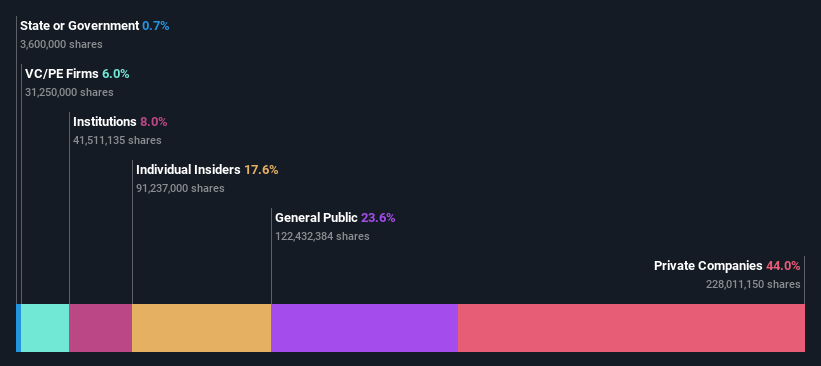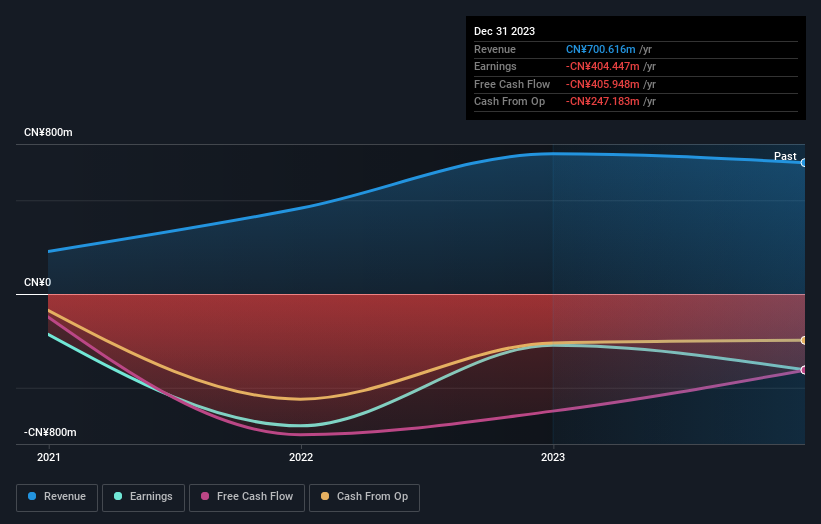Stock Analysis
- Hong Kong
- /
- Electrical
- /
- SEHK:9663
Sino-Synergy Hydrogen Energy Technology (Jiaxing) Co., Ltd.'s (HKG:9663) largest shareholders are private companies who were rewarded as market cap surged HK$1.5b last week

Key Insights
- Sino-Synergy Hydrogen Energy Technology (Jiaxing)'s significant private companies ownership suggests that the key decisions are influenced by shareholders from the larger public
- A total of 5 investors have a majority stake in the company with 52% ownership
- Insider ownership in Sino-Synergy Hydrogen Energy Technology (Jiaxing) is 18%
Every investor in Sino-Synergy Hydrogen Energy Technology (Jiaxing) Co., Ltd. (HKG:9663) should be aware of the most powerful shareholder groups. With 44% stake, private companies possess the maximum shares in the company. In other words, the group stands to gain the most (or lose the most) from their investment into the company.
Clearly, private companies benefitted the most after the company's market cap rose by HK$1.5b last week.
In the chart below, we zoom in on the different ownership groups of Sino-Synergy Hydrogen Energy Technology (Jiaxing).
Check out our latest analysis for Sino-Synergy Hydrogen Energy Technology (Jiaxing)

What Does The Institutional Ownership Tell Us About Sino-Synergy Hydrogen Energy Technology (Jiaxing)?
Institutional investors commonly compare their own returns to the returns of a commonly followed index. So they generally do consider buying larger companies that are included in the relevant benchmark index.
We can see that Sino-Synergy Hydrogen Energy Technology (Jiaxing) does have institutional investors; and they hold a good portion of the company's stock. This implies the analysts working for those institutions have looked at the stock and they like it. But just like anyone else, they could be wrong. It is not uncommon to see a big share price drop if two large institutional investors try to sell out of a stock at the same time. So it is worth checking the past earnings trajectory of Sino-Synergy Hydrogen Energy Technology (Jiaxing), (below). Of course, keep in mind that there are other factors to consider, too.

Sino-Synergy Hydrogen Energy Technology (Jiaxing) is not owned by hedge funds. Our data suggests that Xiaomin Chen, who is also the company's Top Key Executive, holds the most number of shares at 15%. When an insider holds a sizeable amount of a company's stock, investors consider it as a positive sign because it suggests that insiders are willing to have their wealth tied up in the future of the company. In comparison, the second and third largest shareholders hold about 13% and 8.8% of the stock. In addition, we found that Zeyun Yang, the CEO has 1.0% of the shares allocated to their name.
Our research also brought to light the fact that roughly 52% of the company is controlled by the top 5 shareholders suggesting that these owners wield significant influence on the business.
While studying institutional ownership for a company can add value to your research, it is also a good practice to research analyst recommendations to get a deeper understand of a stock's expected performance. As far as we can tell there isn't analyst coverage of the company, so it is probably flying under the radar.
Insider Ownership Of Sino-Synergy Hydrogen Energy Technology (Jiaxing)
While the precise definition of an insider can be subjective, almost everyone considers board members to be insiders. Company management run the business, but the CEO will answer to the board, even if he or she is a member of it.
I generally consider insider ownership to be a good thing. However, on some occasions it makes it more difficult for other shareholders to hold the board accountable for decisions.
It seems insiders own a significant proportion of Sino-Synergy Hydrogen Energy Technology (Jiaxing) Co., Ltd.. It has a market capitalization of just HK$7.2b, and insiders have HK$1.3b worth of shares in their own names. This may suggest that the founders still own a lot of shares. You can click here to see if they have been buying or selling.
General Public Ownership
The general public-- including retail investors -- own 24% stake in the company, and hence can't easily be ignored. This size of ownership, while considerable, may not be enough to change company policy if the decision is not in sync with other large shareholders.
Private Equity Ownership
With an ownership of 6.0%, private equity firms are in a position to play a role in shaping corporate strategy with a focus on value creation. Sometimes we see private equity stick around for the long term, but generally speaking they have a shorter investment horizon and -- as the name suggests -- don't invest in public companies much. After some time they may look to sell and redeploy capital elsewhere.
Private Company Ownership
We can see that Private Companies own 44%, of the shares on issue. It might be worth looking deeper into this. If related parties, such as insiders, have an interest in one of these private companies, that should be disclosed in the annual report. Private companies may also have a strategic interest in the company.
Next Steps:
While it is well worth considering the different groups that own a company, there are other factors that are even more important. Case in point: We've spotted 2 warning signs for Sino-Synergy Hydrogen Energy Technology (Jiaxing) you should be aware of.
Of course, you might find a fantastic investment by looking elsewhere. So take a peek at this free list of interesting companies.
NB: Figures in this article are calculated using data from the last twelve months, which refer to the 12-month period ending on the last date of the month the financial statement is dated. This may not be consistent with full year annual report figures.
New: Manage All Your Stock Portfolios in One Place
We've created the ultimate portfolio companion for stock investors, and it's free.
• Connect an unlimited number of Portfolios and see your total in one currency
• Be alerted to new Warning Signs or Risks via email or mobile
• Track the Fair Value of your stocks
Have feedback on this article? Concerned about the content? Get in touch with us directly. Alternatively, email editorial-team (at) simplywallst.com.
This article by Simply Wall St is general in nature. We provide commentary based on historical data and analyst forecasts only using an unbiased methodology and our articles are not intended to be financial advice. It does not constitute a recommendation to buy or sell any stock, and does not take account of your objectives, or your financial situation. We aim to bring you long-term focused analysis driven by fundamental data. Note that our analysis may not factor in the latest price-sensitive company announcements or qualitative material. Simply Wall St has no position in any stocks mentioned.
Have feedback on this article? Concerned about the content? Get in touch with us directly. Alternatively, email editorial-team@simplywallst.com
About SEHK:9663
Sino-Synergy Hydrogen Energy Technology (Jiaxing)
Engages in the research, development, production, and sale of hydrogen fuel cell stacks and systems in the People’s Republic of China.
Excellent balance sheet very low.

